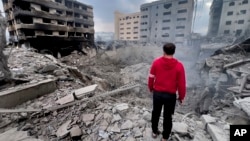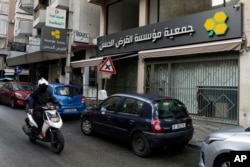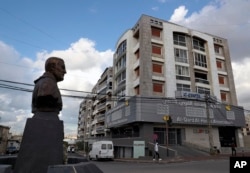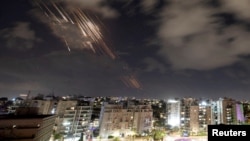
Lebanese militia Hezbollah is running out of money, researchers tell VOA, as a weekslong Israeli offensive against the Iran-backed group disrupts three of its key sources of cash.
U.S. and Lebanon-based researchers and U.S. Treasury Department reports identify Hezbollah’s main cash source as Al-Qard al-Hassan, or AQAH, a Lebanese quasi-banking institution operated by the U.S.-designated terror group without a government banking license. The researchers say the group’s other cash sources include Lebanon’s insolvent but licensed commercial banks and arrivals of cash-bearing planes at Beirut’s airport.
The Israeli military escalated its attacks on Hezbollah leaders and facilities last month, after 11 months of limiting its responses to the militia’s daily attacks on northern Israel in support of Hamas. The Palestinian terror group, also backed by Iran, invaded southern Israel from Gaza last October, sparking a fierce Israeli response.
Hezbollah founded AQAH in 1982 as a charitable institution providing interest-free loans to needy Lebanese, primarily fellow Shiites, according to Israel's Meir Amit Intelligence and Terrorism Information Center, or ITIC, a nongovernmental research group of Israeli intelligence community veterans.
ITIC says AQAH has since grown into a major institution with branches in Hezbollah’s southern Beirut stronghold of Dahiyeh and other Hezbollah-dominated parts of Lebanon.
The U.S. Treasury Department sanctioned AQAH in 2007. In a 2021 announcement of further sanctions on AQAH employees, it said the institution had amassed about half a billion dollars.
AQAH was hit hard by Israel’s initial airstrikes on Hezbollah targets in Dahiyeh in late September, according to MTV Lebanon, one of the country’s leading TV networks.
In a September 30 Arabic-language report, MTV Lebanon said the Israeli airstrikes had targeted Hezbollah’s “cash storage centers, including a large part of the AQAH vaults,” leaving the group in what it called a “financial crisis.”
Hilal Khashan, a political science professor at the American University of Beirut, said in a Wednesday phone interview that Israel “destroyed” most of AQAH’s branches in the airstrikes. “Hezbollah is facing a very serious financial problem. They are unable to pay rank and file members who have fled their homes and need to feed their families,” Khashan said.
The Treasury Department’s 2021 announcement of sanctions against six AQAH employees said they had used personal accounts at licensed Lebanese banks to transfer more than $500 million to and from AQAH over the previous decade. It said that activity gave AQAH access to the international financial system through the employees’ personal accounts at the Lebanese banks.
David Asher, a former U.S. Defense and State Department official who targeted Hezbollah’s global drug trafficking and money laundering networks, said in a separate interview Wednesday that the group is in “deep trouble” because it also is losing access to the Lebanese banking system.
“I’m hearing from Lebanese bankers, including Hezbollah financiers, that Lebanon’s wealthiest bankers who can afford to fly have fled to Europe and the Gulf, fearing they could be targeted next by Israel for helping Hezbollah,” said Asher, a senior fellow at the Washington-based Hudson Institute. Asher said he is in contact with Lebanon-based sources whom the U.S. recruited over the years to provide information about Hezbollah.
“These Lebanese bankers, most of them billionaires, see the wind is blowing against Hezbollah, so they are not going to let it take millions of dollars out of their banks, which still have cash despite being bankrupt on paper,” Asher said. “They know that if they do, Israel probably will eliminate them, too.”
Another Hezbollah funding source that has dried up, according to Asher and Khashan, is deliveries of cash on planes flying to Beirut’s airport, particularly from Iran, the group’s main patron.
Israeli military spokesperson Daniel Hagari told reporters on September 27 that Israeli warplanes had begun patrolling the airspace of Beirut’s airport and would not allow hostile flights carrying weapons to land at a civilian facility. He did not mention the issue of cash being transported aboard what Israel deems to be hostile flights.
The next day, Lebanon’s Transport Ministry told Lebanese and Western media that it ordered an Iranian plane bound for Beirut to turn away from Lebanese airspace. The ministry attributed the move to an Israeli warning to Beirut’s air traffic control tower that Israel would use force if the plane landed there.
“I’ve heard from my Israeli counterparts that the Iranians are scared to send money to Lebanon right now because Israel is threatening to target flights into Beirut. The Israelis are warning they will target flights full of money, not just weapons,” Asher said.
Khashan said Iran used to organize regular flights from Tehran to Beirut to smuggle cash to Hezbollah without going through the Lebanese government's customs department. “In the weeks since Israel escalated its attacks on Beirut’s southern suburbs, the Lebanese government has asserted more control over the airport, and now there is no cash flow to Hezbollah,” Khashan said.
Lebanese Minister of Public Works and Transport Ali Hamieh told Agence France-Presse on Tuesday that the Beirut airport “is subject to Lebanese laws and to the scrutiny of various relevant departments and security agencies.” Hamieh added that any plane carrying weapons must be approved by the Lebanese army and be licensed by his ministry.
Saudi TV network Al Arabiya in a Thursday report cited a Lebanese army source saying the army and other security agencies have been “scrambling” to assert control over the airport by starting inspections of cargo shipments to ensure their contents are as declared.
Khashan said Hezbollah’s lack of cash is unlikely to stop its thousands of operatives from fighting Israeli forces anytime soon.
“Keeping up the fight depends more on the availability of food and ammunition,” he said. “When your fight is motivated by religious zeal, you have more fundamental issues to worry about than the availability of cash.”









